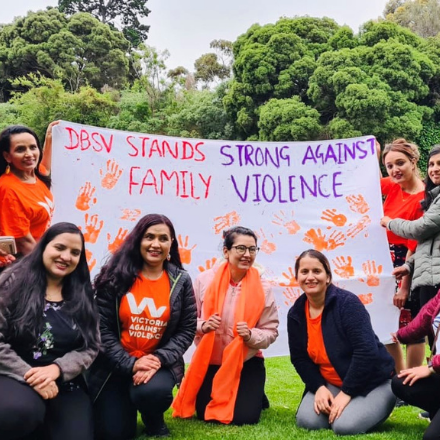For many, the holiday season brings a sense of joy and celebration. It’s a time for reflection and festivity, a time to get together with family and friends – some of whom we may be seeing for the first time in almost two years. But for others, this is a time of fear.
December and January have long been the busiest time of year for specialist family violence support services. This is reflected in data on calls to services and police, which dramatically increased during the 2020-21 holiday season. According to Victoria Police figures, more than two thirds of all assaults reported between Christmas and New Year’s Day were related to family violence, with police attending a family violence incident every five minutes.
By the time all the presents have been opened, the food eaten, and the crackers popped this Christmas, there will have been approximately twice as many family violence assaults compared to other days in the year. These increases come on top of already alarming rates of family violence seen during the COVID-19 pandemic.
These numbers are staggering. Yet they don’t even paint the whole picture, as we know most people experiencing abuse will never contact the police. Many, however, will tell a friend, family member, or colleague.
So what can we, as a community, do to help? We all have a part to play in preventing and responding to family violence by looking out for friends, family and neighbours, and knowing what action to take if we are concerned someone may be experiencing abuse.
How do I know if it’s family violence?
Family violence is a pattern of threatening, controlling or violent behaviour that makes someone feel scared or unsafe. While it impacts people of all genders, identities, age groups, sexual orientations, cultural backgrounds and walks of life, most family violence is perpetrated by men, against women.
It’s also important to remember that family violence doesn’t always involve physical abuse. It can also include behaviours like threats, financial control, and emotional abuse. It is often cyclical – there may be periods of time without violence, and times where the violence is heightened. No matter what form it takes, family violence is never acceptable.
Common signs to look out for:
Someone who is experiencing family violence may not openly disclose that they are being abused, but there are often signs that indicate something is not right.
They may withdraw from loved ones or seem depressed. Their partner, ex-partner or family member may undermine their credibility, criticise or humiliate them publicly. They may seem afraid or nervous when this person is around, or may have cuts, bruises and other injuries with unlikely explanations. Perhaps they have mentioned their partner or family member’s temper or jealousy to you. Maybe you have seen their partner constantly calling, texting or monitoring their movements.
For children or young people who may be experiencing family violence, the signs can be harder to recognise. Sudden behaviour changes like difficulty concentrating, not wanting to go home, ‘acting out’ or becoming angry and aggressive at friends and family can mean there is something going on.
What can I do?
If anyone is in immediate danger, always call the police on triple zero (000). If there is no immediate risk, the best thing you can do is find an opportunity to speak with the person you’re concerned about alone, and approach them with sensitivity and empathy. For people experiencing abuse, being asked a simple question like ‘are you safe at home?’ can make a world of difference.
If someone discloses violence or abuse to you, it’s important you listen without judgement or criticism – the violence is never their fault. Saying ‘just leave’ is not helpful – there are many reasons why someone may be unable or unwilling to leave an abusive partner.
Help build confidence by acknowledging their bravery in sharing. Tell them that you believe them, and you want to help.
Help them make a safety plan – this could include being their emergency contact, agreeing on a code word or signal they can use if they need help, looking after copies of important documents and items in case they need to leave home quickly, or providing practical support like childcare or assistance with errands.
Let them know professional support is available – a good place to start is the list of Victorian services on the Are You Safe At Home website.
It can be scary to ask the question, but it could be the greatest gift you give these holidays.
For 24/7 family violence crisis support and accommodation in Victoria, contact Safe Steps on
1800 015 188.
For support and information in other states and territories, contact 1800RESPECT on 1800 737 732.
For tailored LGBTIQA+ support and information in Victoria, contact Rainbow Door on 1800 729 367.
If you or someone you know may be at risk of using family violence, contact the Men’s Referral Service on 1300 766 491.
*This op-ed from Safe and Equal CEO Tania Farha was originally published in the Herald Sun on Tuesday 21 December 2021.
Page last updated Tuesday, December 21 2021




